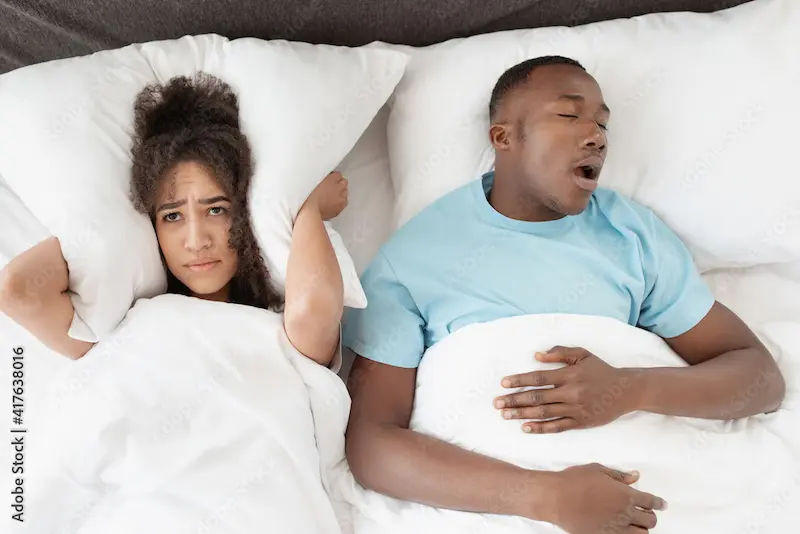Guide to Snoring And Its Implications
Know about snoring, what it is, common causes, risk factors, when it is serious, treatment options and more.

Written by Dr. M L Ezhilarasan
Reviewed by Dr. Rohinipriyanka Pondugula MBBS
Last updated on 13th Jan, 2026

Introduction
That familiar, rumbling sound in the night is more than just a punchline or a nuisance for your partner. Snoring is a common condition that affects nearly 90 million American adults, with 37 million regularly. But what exactly is it? Simply put, snoring occurs when the flow of air through your mouth and nose is physically obstructed while you sleep. This causes the tissues in your throat to vibrate, producing the characteristic snoring sound. This guide will demystify the implications of snoring, explore its root causes, and provide actionable solutions, ranging from simple lifestyle changes to advanced medical interventions, to help you and your loved ones achieve a quieter, healthier night's sleep.
What Exactly Is Snoring? The Science Behind the Sound
Snoring is the hoarse or harsh sound that occurs when air flows past relaxed tissues in your throat, causing them to vibrate as you breathe. Everyone has the potential to snore occasionally. Factors like a cold or allergies can cause temporary snoring. However, for some, it becomes a chronic condition.
Consult Top Doctors for Personalised Advice
The process typically involves:
- Muscle Relaxation: During sleep, the muscles in the roof of your mouth (soft palate), tongue, and throat relax.
- Airway Narrowing: These relaxed tissues can partially block your airway and vibrate.
- Turbulent Airflow: The narrower your airway becomes, the more forceful the airflow gets. This increased velocity amplifies tissue vibration, making your snoring louder.
Understanding this mechanism is the first step toward finding an effective solution. The key is identifying why your
airway is narrowing in the first place.
Common Causes and Risk Factors of Snoring
Snoring doesn't have a single cause. It's usually a combination of anatomical factors and lifestyle choices. Identifying your personal risk factors is crucial for targeted treatment.
Anatomical and Physiological Factors
- Mouth Anatomy: A low, thick soft palate or elongated uvula can narrow the airway. Deviated septa or chronic nasal congestion also significantly contribute to obstructed breathing.
- Being Overweight: Excess weight, especially around the neck, puts pressure on the airway, making it more likely to collapse during sleep. This is one of the most significant risk factors for loud snoring.
- Gender: Men are more likely to snore or have sleep apnea than women due to having narrower air passages.
- Age: As we get older, our throats become narrower, and muscle tone decreases.
Lifestyle and Habitual Triggers
- Alcohol Consumption: Alcohol relaxes throat muscles and reduces your natural defense against airway obstruction, leading to intense snoring.
- Sleep Position: Sleeping on your back allows gravity to pull the tissues in your throat downward, worsening airway obstruction. Positional snoring is very common.
- Smoking: Irritation from smoking can inflame and swell the membranes in the nose and throat, blocking airflow.
- Sleep Deprivation: Not getting enough sleep can lead to further throat relaxation.
When Snoring Is Serious: Understanding Sleep Apnea
This is the most critical section regarding the implications of snoring. Not all snorers have apnea, but almost everyone with obstructive sleep apnea snores.
Obstructive Sleep Apnea (OSA) is a disorder characterised by repeated episodes of complete or partial upper airway obstruction during sleep. These pauses in breathing can last from 10 seconds to over a minute and can occur hundreds of times a night. Each time, your brain briefly wakes you up to restart breathing, fragmenting your sleep and preventing you from reaching restorative deep sleep stages.
Key signs that your snoring might be OSA include:
Key signs include:
- Loud, chronic snoring interrupted by pauses, snorts, or gasps.
- Witnessed episodes of stopped breathing during sleep (reported by a partner).
- Choking or gasping sensations during the night.
- Excessive daytime sleepiness and fatigue.
- Morning headaches and dry mouth.
- Difficulty concentrating and irritability.
A study published in the American Journal of Respiratory and Critical Care Medicine found that moderate to severe sleep apnea significantly increases the risk of all-cause mortality. This underscores the importance of diagnosing and treating the condition, not just for improving sleep quality, but also for maintaining long-term health.
The Far-Reaching Health Implications of Chronic Snoring
Leaving chronic snoring, especially when linked to OSA, untreated, can have severe consequences for your overall health.
- Cardiovascular Strain: The repeated drops in blood oxygen levels increase blood pressure and strain the cardiovascular system, raising the risk of hypertension, heart attack, stroke, and atrial fibrillation.
- Metabolic Disruption: Sleep apnea is strongly linked to insulin resistance and the development of type 2 diabetes.
- Mental Health Impact: Chronic sleep fragmentation leads to daytime fatigue, low energy, anxiety, and depression. It can also exacerbate mood swings and irritability.
- Cognitive Decline: Poor sleep quality affects memory, concentration, and overall cognitive function.
- Reduced Quality of Life: General fatigue can reduce productivity and enjoyment of daily activities and increase the risk of accidents, especially while driving.
How Is the Cause of Snoring Diagnosed?
If you suspect your snoring is a problem, a medical diagnosis is essential. If your symptoms persist beyond two weeks and are affecting your daily life, consult a doctor online with Apollo24|7 for further evaluation.
- Medical History and Physical Exam: A doctor will review your symptoms, sleep patterns, and medical history and examine your nose, mouth, throat, and neck.
- Sleep Study (Polysomnogram): This is the gold standard for diagnosing sleep apnea. It can be done in a lab or at home with a portable kit. It monitors your heart, lung, and brain activity, breathing patterns, arm and leg movements, and blood oxygen levels while you sleep.
Effective Treatments and Remedies for Snoring
The good news is that numerous effective treatments exist, ranging from simple DIY approaches to advanced medical devices.
Lifestyle Modifications and Home Remedies
The lifestyle and home remedies include:
- Lose Weight: Even a small amount of weight loss can reduce fatty tissue in the back of the throat and is often the most effective natural remedy for snoring.
- Change Sleep Position: Training yourself to sleep on your side can prevent the tongue from blocking the throat. Tennis balls sewn into the back of pyjamas can help.
- Avoid Alcohol and Sedatives: Refrain from consuming alcohol at least 3-4 hours before bedtime.
- Treat Nasal Congestion: Use saline sprays, nasal strips, or a neti pot to keep nasal passages open if allergies or a deviated septum are issues.
- Stay Hydrated: Secretions in your nose and soft palate become stickier when you're dehydrated, which can worsen snoring.
Medical Devices and Procedures
- Oral Appliances: These are custom-fitted dental devices that resemble sports mouthguards. They work by advancing your jaw or holding your tongue forward to keep your airway open.
- CPAP (Continuous Positive Airway Pressure): This is the most common and reliable treatment for moderate to severe OSA. A machine delivers air pressure through a mask to keep your airway open during sleep.
- Surgery: Procedures like Uvulopalatopharyngoplasty (UPPP) or maxillomandibular advancement (MMA) are options for when other treatments fail. They aim to remove or stiffen excess tissue or correct structural problems.
When to See a Doctor: Warning Signs
Don't hesitate to seek professional help if you experience any of the following:
- Your snoring is so loud it disrupts your partner's sleep.
- You wake up gasping or choking.
- You experience excessive daytime sleepiness.
- You have observed pauses in your breathing during sleep.
- You have high blood pressure or heart problems that are difficult to manage.
If your condition does not improve after trying these methods, book a physical visit to a doctor with Apollo24|7 for a comprehensive assessment and personalised treatment plan.
Conclusion
Snoring is far more than a simple nighttime annoyance; it's an audible signal from your body that your breathing during sleep is compromised. While occasional snoring may be benign, understanding the serious implications of chronic, loud snoring—particularly its link to Obstructive Sleep Apnea—is crucial for safeguarding your long-term health. The risks to your cardiovascular system, metabolic health, and mental well-being are too significant to ignore. The path to a quieter night and a healthier life begins with awareness. By honestly assessing your symptoms, implementing positive lifestyle changes, and most importantly, seeking a professional medical opinion when needed, you can address the root cause of your snoring. Take that step today. Prioritise your sleep, and you'll be investing in your health for years to come.
Consult Top Doctors for Personalised Advice
Consult Top Doctors for Personalised Advice

Dr. Mainak Baksi
General Practitioner
13 Years • MBBS , MD (MPH)
Howrah
Mainak Baksi Clinic, Howrah
(50+ Patients)

Dr Divya Lekha Gunta
General Practitioner
10 Years • MBBS, MD (Pathology)
Visakhapatnam
Apollo 24|7 Clinic - Andhra Pradesh, Visakhapatnam

Dr Suseela
General Physician
5 Years • MBBS
Bengaluru
Apollo Medical Center, Marathahalli, Bengaluru

Dr. Rajib Ghose
General Physician/ Internal Medicine Specialist
25 Years • MBBS
East Midnapore
VIVEKANANDA SEBA SADAN, East Midnapore

Dr. Siri Nallapu
General Practitioner
5 Years • MBBS
Hyderabad
Apollo 24|7 Clinic, Hyderabad
Consult Top Doctors for Personalised Advice

Dr. Mainak Baksi
General Practitioner
13 Years • MBBS , MD (MPH)
Howrah
Mainak Baksi Clinic, Howrah
(50+ Patients)

Dr Divya Lekha Gunta
General Practitioner
10 Years • MBBS, MD (Pathology)
Visakhapatnam
Apollo 24|7 Clinic - Andhra Pradesh, Visakhapatnam

Dr Suseela
General Physician
5 Years • MBBS
Bengaluru
Apollo Medical Center, Marathahalli, Bengaluru

Dr. Rajib Ghose
General Physician/ Internal Medicine Specialist
25 Years • MBBS
East Midnapore
VIVEKANANDA SEBA SADAN, East Midnapore

Dr. Siri Nallapu
General Practitioner
5 Years • MBBS
Hyderabad
Apollo 24|7 Clinic, Hyderabad
More articles from Snoring
Frequently Asked Questions
1. Can snoring be cured permanently?
The permanence of a 'cure' depends on the cause. For snoring caused by lifestyle factors like weight or alcohol, permanent changes can eliminate it. For anatomical issues, ongoing use of a device like CPAP or an oral appliance is often needed to manage it effectively.
2. What is the best sleeping position to stop snoring?
Sleeping on your side is universally considered the best position to reduce or stop snoring. It prevents the tongue and soft tissues in the throat from collapsing to the back of the airway, which happens when sleeping on your back.
3. Do over-the-counter anti-snoring devices work?
Some over-the-counter devices, like nasal strips or dilators, can be effective for simple snoring caused by nasal congestion. However, mandibular advancement devices (MADs) are best fitted by a dentist to ensure they are safe and effective for your jaw and won't cause long-term issues.
4. Is snoring a sign of a heart problem?
While not a direct sign, chronic snoring linked to sleep apnea puts immense strain on the heart. The repeated oxygen deprivation and stress response can lead to hypertension, arrhythmia, and increase the risk of heart attack and stroke over time.
5. Can children have sleep apnea from snoring?
Yes, children can snore and have sleep apnea. Common causes include enlarged tonsils or adenoids. If your child is a loud, chronic snorer, seems restless during sleep, or experiences daytime behavioural issues, it's important to have them evaluated by a paediatrician.



